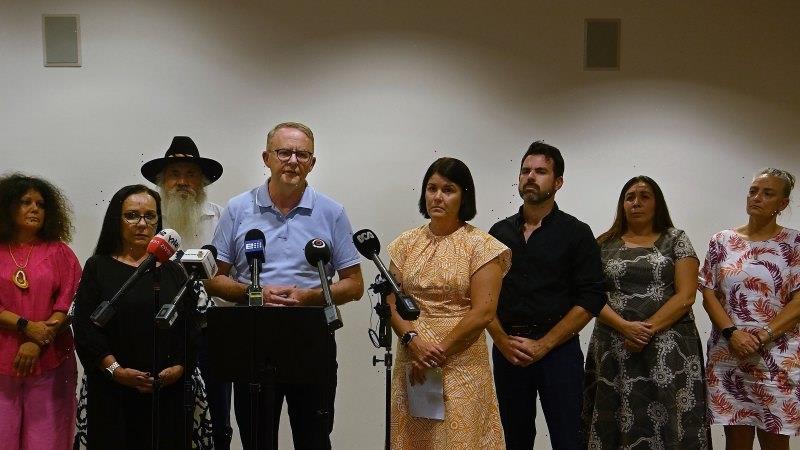By Meg Watson
George Mladenov holding his team’s challenge trophy with Australian Survivor host Jonathan LaPaglia. Credit:Nigel Wright/Network Ten
The first season of Survivor hit our screens a year before the release of the iPod and half a decade before the existence of YouTube. The world hadn’t heard of American Idol or The Amazing Race, and celebrities were yet to welcome MTV into their cribs.
But, in May 2000, standing on the deck of a ship in the South China Sea, host Jeff Probst ignited a global phenomenon that continues to this day: “39 days. 16 people. One sole survivor”.
More than two decades later, there have been 43 seasons of the show in the US and long-running local versions in more than 25 other countries, including Australia. The very first iteration of the franchise actually debuted in Sweden in 1997, under the name Expedition Robinson, now just called Robinson, which is still on air. On Monday night, Australian Survivor will kick off its 10th season – the last eight of which have run on Channel 10 since 2016, with Jonathan LaPaglia as host – and expectations are high.
In an age when most old reality TV stalwarts are struggling for both ratings and relevance, Survivor endures. Though it will never match the monster broadcast audience of the US version’s early days, the series continues to attract far more viewers than comparable shows like Big Brother and The Bachelor, it has an enormous global community of superfans, and it’s recently received renewed critical attention too.
As The New Yorker wrote in December 2021, “Survivor is still compulsively watchable … a rare [example of] a well-established franchise making room for genuine evolution”.
Jeff Probst hosts Survivor: Winners at War, the show’s 40th season which aired in 2019.
Survivor diehard Shannon Guss started watching the show with her parents when she was seven years old, and she’s since built a career both analysing and contributing to this evolution.
“It can be a great family show,” she says. “It has lovable characters, and a lot of kids love the challenges. That all spoke to me [when I was young]. Then, when I reached my adolescence and adulthood, I was drawn to the gamesmanship and complex strategy.”
“It’s like how we watch sport; great sport will always be interesting.”
The show involves a group of strangers being dropped in a remote location, in the vein of subsequent series like Alone and Man vs Wild – but they’re then split into tribes and forced to compete in physical challenges for “immunity’ to stay in the game. When castaways lose challenges, they have to scheme and collaborate to vote each other out, but they also need to stay in those same players’ good graces as they later need their votes to win.
In each season’s finale, a jury of eliminated players picks their “sole survivor” to win a $500,000 prize.
“To me, it’s a lot more intellectual than other reality TV shows,” Guss says. “You put yourself in that situation: like, ‘What would I do? What’s the optimal move here?’ … All those additional layers are there if you want to find them.”
Survivor is a game of physical endurance, but also social strategy.Credit:Nigel Wright/Network Ten
Guss is now a co-host of Channel Ten’s Survivor companion show Talking Tribal, which dissects every episode, and a production consultant on Survivor South Africa.
The latter role involves creating new challenges and managing the game’s twists and turns (such as immunity idols, tribe swaps and special advantages – most of which didn’t exist in the show’s early incarnations) but she says that, ultimately, the series’ longevity and innovation comes from its ever-evolving cast.
“Survivor could go on for the rest of time and still be interesting because you have new players, new characters and new ways of viewing and approaching the game that will never really get old.
“It’s like how we watch sport; great sport will always be interesting.”
Shannon Guss (right) hosts Talking Tribal this year with former Survivor contestants Brooke Jowett and Khanh Ong. Credit:Network Ten
Speaking to Variety last year, the show’s creator Charlie Parsons also put much of its success down to the fact Survivor is about ordinary people. Unlike many current reality shows, the cast are not influencers chasing Instagram clout or business owners trying to get new ventures off the ground. Survivor players are truck drivers and lawyers and accountants – everyday people who just love the game.
One of Australia’s most beloved contestants was Luke Toki: a cheery FIFO mining worker from Western Australia who was trying to win the $500,000 prize for his young family.
Luke Toki (right) appears on Australian Survivor series 2 (2017)Credit:Nigel Wright/Network Ten
In 2019, he appeared on the Champions v Contenders season shortly after his daughter was diagnosed with cystic fibrosis and, when he was eventually voted out, the public raised more than $550,000 to give him directly. The sum was crowdsourced in less than 48 hours.
There’s also a strong tradition, both here and overseas, of people wanting to play because they’ve grown up as fans of the show.
Nick Iadanza, a high school English teacher from Adelaide, is a proud superfan who appeared in two seasons of Australian Survivor. When he was eliminated from All Stars in 2020, he shared a photo of himself on Twitter playing a “homemade version of Survivor” when he was 12 – a “scrawny kid” standing on a stump with a hand on his chin, deep in thought.
“There’s such a rich history [of Survivor fandom] and the culture has developed over decades of the show,” Guss says. She’s personally travelled to the US for events where fans watch the show together, debate gameplay and hear from past players.
“I know people who have not only made friendships through that community, but gotten married and had kids.”
Despite first appearing on Channel Ten as a contestant on MasterChef, Australian Survivor: Blood v Water alum Khanh Ong also counts himself as a fan.
“I think a lot of people believe that I was headhunted, but it was quite the opposite,” he says. “I was a fan of Survivor from way back. I applied. I tried really hard to get on. And I went on because I wanted to play.”
“If you want to go on a show to become super famous, Survivor isn’t it … You’re dirty, you’re scheming, you’re starving. There’s no chance to talk about your skincare routine!”
He puts the show’s success down to the players’ passion for it, the natural human drama you get in this “pressure-cooker environment”, and the game’s general unpredictability.
“MasterChef relies on your ability to cook: you can learn a little bit on the way, but you can’t really change your outcome,” he says. “But in Survivor, you can change your outcome depending on how willing you are to play everyone.
“Survivor is unique because it’s anyone’s game.”
Shane Gould winning Australian Survivor in 2018.
This has certainly proven to be true in Australian Survivor. In 2018, at age 61, former Olympic swimmer Shane Gould became the oldest person crowned sole survivor in any iteration of the game. And in 2021, George Mladenov – a widely maligned political operative nicknamed “the cockroach of Bankstown” – managed to plot his way to second place.
George is returning this season, themed Heroes v Villains, with a freshly tattooed immunity idol around his chest.
If that sounds extreme it’s because it is. But it’s also an indication of how deep the fandom for this show goes – and how much it’s still growing.
Recently broadcast seasons of the Australian show have seen decent viewer bumps as people turned to fun and familiar viewing during lockdowns, and the pandemic resulted in international streaming success too.
In 2020, CBS licensed a couple of seasons of the US series to Netflix, kicking off a new wave of interest in the show and its bingeable back-catalogue.
And later that same year, after complaints from past players, the network pledged that at least 50 percent of all casts would be black, indigenous or people of colour – a move that many critics say has revitalised the US show and potentially invigorated a broader fandom in the process.
As both Probst and LaPaglia say, “In this game, fire represents your life; when your fire’s gone, so are you” – and, against all odds, Survivor’s flame is still burning bright.
Australian Survivor: Heroes v Villains premieres on Monday at 7.30pm on Channel Ten and 10Play. You can watch past seasons of the show (both Australian and international) on 10Play and Paramount Plus.
Find out the next TV, streaming series and movies to add to your must-sees. Get The Watchlist delivered every Thursday.
Most Viewed in Culture
Source: Read Full Article








